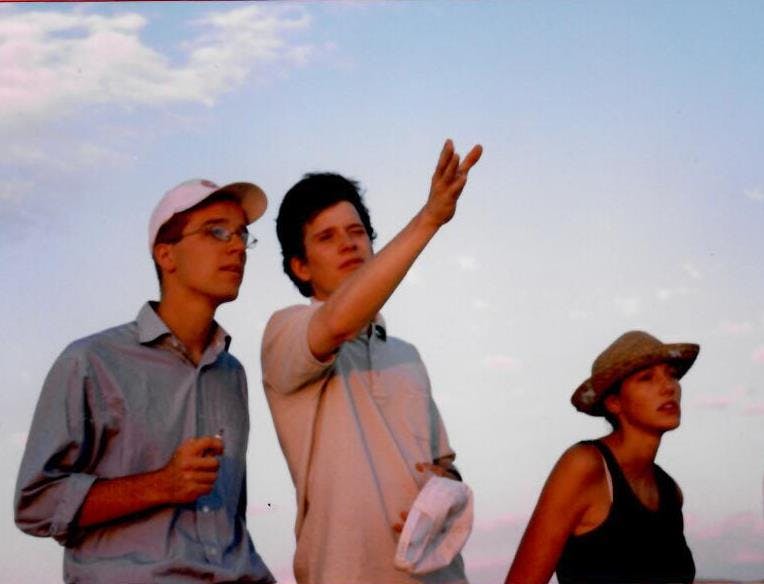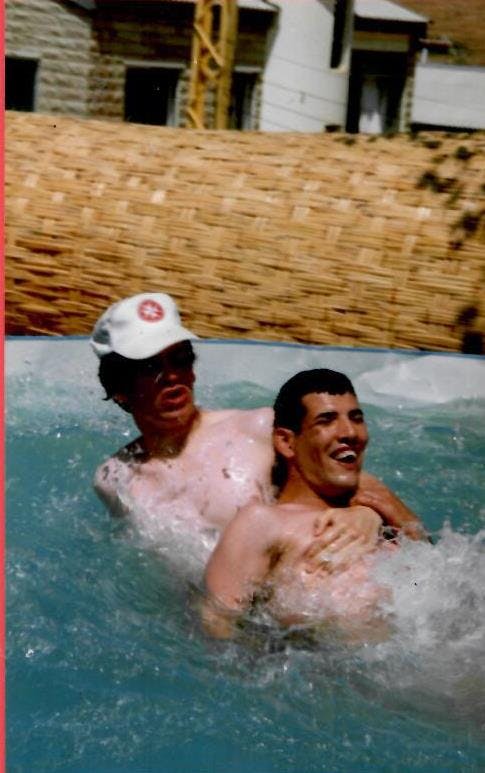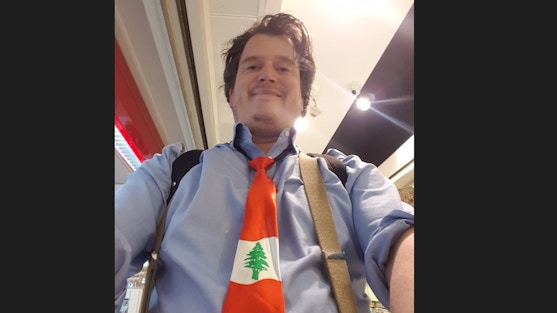Franziskus Heereman - Co-Founder of the Lebanon Project
Introducing Franziskus Heereman
Franziskus Heereman, born in 1976 grew up with the Order of Malta. He teaches as professor for philosophy of social charitable action in Vallendar, is married, has 3 children and lives close to Cologne. He is a member of the Order of Malta, has been volunteering with the Order for nearly 30 years and has founded the Order’s wonderful Lebanon project. We think it is about time to introduce the worldwide Order of Malta family to this remarkable man!
How did you get to know the Order of Malta and why did you decide to get involved?
I got to know the Order of Malta at a very early age because my father worked in the Order’s German Relief Service (Malteser Hilfsdienst, MHD) for as long as I can remember - and we always thought that was really cool. That's why I founded an Order of Malta Relief Service in our village when I was 9 or 10 years old. It consisted of my two brothers, my best friend and me. However, I don't remember the club ever helping anyone, in fact its work consisted of playing pranks and soccer. So this beginning probably doesn't really count.
While my siblings all went to spiritual retreats and other youth events like dance courses, I didn't feel like going to either. Instead of forcing me to go, my father said: "Let’s make a deal. When you're 18 you go to Lourdes, just once, that's all you have to do." I was 13 at the time and agreed, thinking that it was a long way off. After five years of being able to do whatever I wanted in my free time (mainly music and party), I turned 18 and went to Lourdes. That was in 1995 and actually my first real contact with the Order of Malta: one week in Lourdes with the German pilgrimage train from Paderborn. It turned out that my father had made the right bet, because that was and still is the most decisive week of my life - everything that was to become important in my life was given to me in that week.
After a few hours I fell head over heels in love with serving the sick; I found it the most beautiful and dignifying thing one can ever do. At the same time, I immediately developed a very strong sense for the charm of sick and disabled people, for what makes them so special – I felt a great awe towards them and at the same time I laughed so much during the week. And I have developed a special fondness for the charisma of the Order of Malta. I felt that this is a community endowed with a special gift to go beyond the boundaries of comfort in serving the sick: a community that has always had a special reverence for every suffering person, and is called and gifted to bring all their personal abilities into this service and make them fruitful. A community that knows that God is present and at work in the encounter between the helper and the person in need. And finally, I found my faith during this week. Until then I had felt that Christianity consisted mainly of rather unpleasant duties; in Lourdes I experienced what I would call the essence of Christianity: that the absolute reality that grounds and holds everything is absolute love, and that Jesus as the face of this love is worthy of adoration.
From that moment on I wanted to be a Christian. So, I found my faith, my community, my vocation and then on top of that my wife (a fellow volunteer!).
Since then, I have been back to Lourdes every year, and it is always a return to this source. It remains the place where I most strongly feel my vocation as a member of the Order of Malta.
Describe how the Lebanon project came about and how you got involved:
Between military service and my studies, I had a few months to spare and wanted to do something good abroad. So, I asked the MHD’s foreign service and they said what you often hear: we don’t really need you, because we have enough unskilled people on the ground and sending someone there only makes sense if they have specific expertise, which you don't. But we have contacts in Lebanon with a Greek-Melkite priest, Père Josef Hallit, and he kept saying that young people should come visit. If I would like to, I could take a look at what's going on there.
In the summer of 1997, I travelled to Lebanon to the monastery that Père Josef had founded in Chabrouh in the mountains and saw that it was a busy and lively place for retreats, with hundreds of young people participating. In addition, a few years earlier, thanks to a generous donor, Père Joseph had built the Centre Al-Fadi, a very large and accessible house, next to the monastery with the idea of providing a place for the disabled of the country to experience something beautiful. The house was built but lacked the funds and personnel to run it.
Father Romanos, the current director of the Centre Al Fadi, was on his way to becoming a priest at the time and was given the responsibility to see what could be done with this house. When I saw the house, I knew from my experience in Lourdes that it did not require any special expertise to provide a good time for the disabled, as long as there was a doctor or nurse present. I therefore only needed volunteers, as the house was already there, and of course the guests. We travelled throughout the country and visited homes. Most were hesitant until we met the Sisters of the Cross[1], whose approach was to take in the poorest who were not accepted anywhere else. Accordingly, the disabilities were serious and challenging, and the patients were poor. With a ratio of 20 patients to one staff member, it was just a large, noisy institution where each disabled person was essentially left to their own devices. Accordingly, they suffered emotionally, and most could never leave the home for vacation because they had no home to go to, or they were not accepted there.
The Sisters of the Cross thought, "what have we got to lose, let's just give it a try." They have been our main project partners ever since.
I went home and told the German Association’s youth commission[2] that I would now like to offer this as a project. We wrote to our friends and found 27 people who were up for it. The following summer we flew to Lebanon for four weeks.
Then the adventure really began, because we had fundamentally miscalculated what this task entailed. We had imagined it would be similar to the camps for disabled people in Germany: spending time with kind people with disabilities who love to sing, clap and eat ice cream all day long. What we found was completely different: highly traumatized people who often never had any meaningful relationship in their lives, and were completely closed in themselves. They were occasionally violent, always exhibited extreme behavioural anomalies, and were capable of everything but of playing a game or singing a song because they had never done that in their lives.
They got off the bus and literally overwhelmed us.. What was striking was that their gaze was not used to interacting with people. If you didn’t hold onto the fact that these are people like you and me, you could easily have thought that they were something else, because of the difficulty in establishing contact.
Looking back, I have to say, "Thank God we didn't know all of that back then, otherwise we might never have done it!" Everyone would have said, leave it. But they just let us do it and no one talked us out of it, which was great. So there we stood, overwhelmed by our guests, who for the first time were in freedom and could do what they wanted. That meant, of course, that the fitter ones immediately took advantage: you can imagine how they struggled to manage their new-found freedom, and did things that had the biggest possible impact. They threw food on the wall, ran around, smashed chairs, and so on. It was all quite difficult, and we had to become police within hours to bring in some sort of structure. Others just sat around looking completely lost, probably also afraid of this new situation. Then came the night and, unsurprisingly, no one wanted to go to bed just because we said so.
I lay in bed the first night and the whole house was a roar and crash and bang. One guest, the cheeky Elias, howled at the moon from the window all night. I lay there and thought: that was a big mistake. We had a whole month ahead of us and had barely survived the first day.
We somehow managed a tremendously steep learning curve, both with each individual guest and the overall situation. Since joint activities were not possible, it was a matter of everyone just being with their guest - maybe singing to them, running after them or just being there and hoping that something might also bring the guest a bit of fun.
Everyone grew beyond themselves. From the beginning we had the clear intention of keeping God with us in what we did. In the first two years we didn't have a priest with us, but we had daily morning and evening prayers. Sometimes a priest from the monastery came over for Mass. Those prayer times were very intense and we all noticed that there was a presence, a power that goes beyond our own and that works in us and in the guests.
The breakthrough was then quite mysterious because nothing really happened, except that you could somehow notice that some kind of thaw had set in in the hearts of the guests. As in The Chronicles of Narnia, where it is always winter and suddenly, without seeing anything else, you suddenly hear the first drops of melting snow - that is actually the turning point. That's how it was. Suddenly, you found yourself in situations where you looked into someone's face and thought: 'Wow, this is the first time the person has dared to leave the retreat they've been in for years, in search of security, to open up and receive the message from outside that someone else is saying: "It's good that you exist." That's what the nuns told us when they visited us or saw the guests again in the home, that something fundamental was beginning to change in the guests. That was the core experience of this time and the reason to continue. In that sense, it's a special project because it doesn't change life circumstances or primarily provide goods, but it's sort of intensive care at the level of the heart, intensive care of the relationship. Because we always have one-to-one care, it's about giving people at least one time a year where they receive a boost of attention, acceptance, love, and friendship, without which life is simply too hard.
Of course, they have to return, but something in their life has changed because they've started to learn that they are valuable and loved. This learning process continues. From the beginning, we've said that the message has to be a constant in the guests' lives, even if it's only once a year for most of them. That still changes everything.
Then what happened with the project?
We kept coming back, for a month every year. In 2003, we increased this to two teams and two months. In the 2010s, we made many contacts with other Order of Malta youth groups in Europe, so the Dutch and English started running their own camps. The Swiss, Spanish, French, and Austrians followed, always together with Lebanese volunteers, so we could set a shining light in more and more people's lives this way.[3]
Today there is a large group of Lebanese youth without whom the project would not run: these people carry the main load of the project and work for our guests all year round. Of course, we've also been able to bring about changes in the homes through additional fundraising like Project Karim[4].
The impact on the teams providing this service is very remarkable. Although it does not have the same significance as Lourdes - the Order without Lourdes would be unimaginable - but the experience in Lebanon has initiated a new generation and comes directly from Lourdes, transferring the Lourdes experience to Lebanon.
Seven or eight European countries are serving now together with the Lebanese in the same place and context. All experience the same thing and do so in cooperation, which is very important for the future of the Order. A generation is growing up that speaks a similar language because they have experienced the same thing and therefore have a basis of trust.
That is also so beautiful at the International Maltacamps[5], where there is no division between volunteers – no “them and us” mentality, but that one shares as much life as possible.
Can you share one or two highlights from your time with the Order of Malta. What motivates you to continue your service?
The real highlights cannot be described; it is when you observe real love taking place, where one is there for another and that love reaches the other person. The fulfilment one feels when this happens, what it means for both, in that moment the “kingdom of heaven”, as Jesus says, is actually present! In that moment, the world is as it should be. It's a quiet miracle, but I know of nothing more beautiful.
What advice would you give young volunteers of the Order of Malta?
Don't underestimate the potential of young people. They don't need watchdogs and worriers, but support and freedom. Wherever an association gives young people a lot of responsibility and support, it pays off a hundredfoldTo young people: simply to listen to the voice of your own hearts. We are so used to everything being approached strategically and with a business plan, everything being so calculated. I believe that this is not necessarily God's way, but that sometimes you simply feel a concrete call, follow it and see what comes of it. Big things can come of it, but it is not at all decisive whether it becomes big in terms of numbers. Love is always fruitful.
What would you say to someone who asks why he/she should volunteer with the Order of Malta?
One can certainly do service anywhere, but the Order of Malta are the oldest charitable movement in the world that still exists, and I think that has something to do with the fact that they have been gifted something, a unique mentality, a unique strength, a unique approach. In our spiritual DNA we have this fighting spirit, this going where it is difficult, not always complaining about obstacles, but simply move them out of the way.. We throw ourselves into it, with our whole person and also with all the means the world provides, all the intelligence and technical possibilities, but also with this fighting camaraderie, good humour, and a good celebration when you're done; it’s this simultaneity of tender love for the suffering human being and the rough fighting spirit, when it is necessary to stand up for him.
And from the spiritual side: There are many ways to God. For the Order of Malta, the way to the suffering person is a way to God, and the way to God is a way to the suffering person. - I think that's venerable, and something one should once have experienced.
[1] The Sisters of the Cross care for 2,500 vulnerable disabled individuals across five homes.
[2] At the beginning of the 1980s, the German Association set up a Jugendkommission (youth commission) with the idea that the Order in Germany also needed something for the youth to prevent the Association of becoming too old. In 2004 Franziskus and others turned it into the Gemeinschaft junger Malteser, a community of young, faithful Catholics who place themselves in the mission and charism of the Order of Malta: serving the sick and witnessing our Christian faith.
[3] Today 36 one-week camps are organized per year with 10 nationalities and 14 leading delegations serving every year a couple of hundred guests.
[4] https://libanonprojekt.de/karimprojekt.html

Franziskus together with two friends at one of the first camps in Chabrouh.

Franziskus swims with his guest during one of the first camps.
Related Posts
Marina Fairfax - Founder of the Computer Club and youngest member of the Order of Malta in Hong Kong
| Introducing...Marina is 33 years old, grew up in the United Kingdom, spent many years in ...



